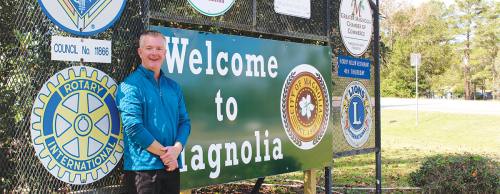Members of the Greater Magnolia and Magnolia Parkway chambers of commerce voted in late October to merge the chambers, a decision that comes nearly six months after the chambers formed a committee to research the feasibility of a merger.
The unified chamber becomes official Jan. 1. Each chamber will act separately until then, and no information has been shared regarding the name of the unified chamber.
“There’s a lot of work to be done,” said Kendrick Skipper, chairman of the transition board for the chambers. “We just think that there’s a lot of opportunity and potential ahead.”
Ballots were cast Oct. 24-28. According to a statement from the Unification Transition Committee, each business was allowed one vote per chamber in which the business is a member.
Business and residential growth in the Greater Magnolia area prompted the vote to unify, GMCC Past Chairman Terre Albert said.
“Because we’ve recognized that our community is growing so large and will be growing over the next few years, I think that this is a great step to be ready for the growth that is happening in this area,” Albert said.
Skipper said the combined membership of both chambers is about 400 members, meaning that 90 percent of the nearly 4,000 businesses within Magnolia ISD boundaries are members of neither chamber. Additionally, as there is strength in numbers and in unity, unification will yield benefits beyond the business community, he said.
“Stronger organizations that come together to unite, no matter what they are, can be a positive force for the entire community,” Skipper said. “We just want to be that organization that serves the business community, which in turn every business [serves] the community that they’re in.”
Unification

Members of the Magnolia Parkway and Greater Magnolia chambers of commerce voted in late October to unify the chambers after about 12 years of the chambers serving separate areas of the Magnolia community.[/caption]
While the mission of the unified chamber is to act as a voice for businesses, Skipper said it is the city’s duty to pursue economic development.
“I think the chamber provides a voice in economic development,” he said. “Economic development really resides within the jurisdiction of cities and municipalities because economic development is usually funded through tax sources.”
Skipper said now that members have approved the unification, the transition board is discussing how to implement a unified chamber. He said members of the Unification Transition Committee did not want to plan too far ahead in case unification was not approved.
“We painted a picture and a blueprint of what [a unified chamber] looks like,” he said. “We are charged as a transition board to figure out all of the intricacies and the details.”
According to a proposal from the Unification Transition Committee, a single chamber will cultivate the values of both chambers: service, trust, listening, partnerships, and a positive business environment. The committee also proposed adopting five tiers of annual membership—ranging from $150 for individuals and nonprofits to $3,000 for a platinum membership—to secure funds for the chamber and provide promotional opportunities for member businesses. Higher-tiered members can use a portion of their membership fees for investment, or promotional, opportunities throughout the year.
The chambers of commerce host a variety of monthly networking events for businesses in addition to community events hosted in partnership with other entities, such as the City of Magnolia and MISD—all of which are expected to be retained in unification, Albert said. Events include Pedaling for Success, the Fall Harvest Festival, the GMCC barbecue cookoff and the MPCC shootout event.
“The focus of a larger chamber and a larger board and a larger membership is that we can still continue to do all the events,” Albert said.
A unified chamber will also give member businesses more governmental influence on a county and state level, he said.
“I think a larger, more influential group that services a larger territory, [and] a larger community, will be better for businesses because they’ll have a larger sphere of influence,” Albert said. “I think it’s a great thing that the chambers have come back together.”
A Historical Overview
From its founding in 1981 until about 2004, the GMCC—formerly known as the Magnolia Chamber of Commerce—was the sole chamber of commerce in Magnolia. As the business community grew at the west end of FM 1488 beyond Magnolia city limits, businesses farther out decided to form their own chamber so as to be better represented, Albert said.
“[This] made a lot of businesses have to choose which chamber you were going to participate with,” he said. “Some of us made the choice that actually we need to be a part of both, because we’re bigger than just the city interests.”
Since the split, the Greater Magnolia area has experienced significant growth, specifically along FM 1488—territory that lies between the offices of both chambers. Each chamber’s boundaries became clouded as a result.
Chamber representatives previously said there is a 35 percent overlap in membership between the chambers.
Jason Rinn, owner and broker at Mortgage Outfitters, said he has been a member of both chambers for about the last five years. Rinn said he joined the MPCC first around 2005.
“At that point in time, it was two different demographics and two different cultures that were serving two separate areas,” he said.
Rinn, who served as chairman of the MPCC in 2012, said a merger had been discussed in recent years, but little action was ever taken.
“This conversation has happened several different times, and it is encouraging that it has finally come to a positive outcome,” he said.
In May, the idea of a unified chamber caught on. The chambers’ boards of directors appointed four members from each chamber to a Magnolia Exploratory Committee, which researched the feasibility of a merger and recommended Aug. 1 that the chambers unify.
In late August, the boards formed the Unification Transition Committee to outline what a unified chamber would look like. When members of each chamber cast their ballots in late October, Albert said 89 percent of votes cast supported a unified chamber.
The transition board, which was formed in November, includes seven members of each existing board of directors. The transition board will lead the unified chamber in its first year, after which no leadership plans have been discussed, Skipper said.
In working toward unification, all staff positions for the chambers will be retained. However, a unified chamber will reduce inefficiencies and allow it to have more resources, Skipper said. The Unification Transition Committee projects the unified chamber’s yearly net profits to be $41,800.
Long term, the unified chamber is expected to have its future office in the area referred to as “the Golden Triangle,” located inside Magnolia city limits at the intersection of FM 149 and FM 1488.
One chamber, one city
 Growth in the Magnolia business community prompted unification.[/caption]
Growth in the Magnolia business community prompted unification.[/caption]
As the city of Magnolia is poised for growth, Economic Development Coordinator Tana Ross said a single chamber allows the community to share a stronger message of growth and development.
“For the Greater Magnolia community on the whole, it’s going to be a way to get the story of the city of Magnolia out to a larger group in a very credible way,” she said. “Our focus is getting good information out and us all having the same [information to share with the community].”
While many businesses served by the MPCC are in the city of Conroe’s extraterritorial jurisdiction, Ross said the city has already reached out to the chambers to form a broader partnership.
“We are delighted that people identify with Magnolia [and] that people want to be in Magnolia and a part of Magnolia because of the values that we share,” she said. “We have long been known as the community of unity, so I think it’s those values that will serve us all well as this transition takes us to a new level with the chambers.”





